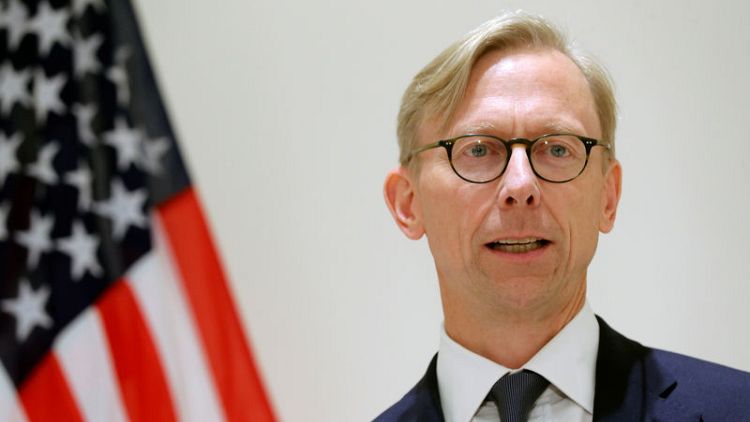By Humeyra Pamuk
WASHINGTON (Reuters) - Iranian security forces may have killed more than 1,000 people, the top U.S. diplomat for Iran said on Thursday, since protests over gasoline price hikes began in mid-November, a crackdown U.S. President Donald Trump described as "horrible."
Speaking at a press briefing at the U.S. State Department, Brian Hook, U.S. Special Representative for Iran, said among those killed were at least a dozen children and "many thousands of Iranians" were also wounded.
"As the truth is trickling out of Iran, it appears the regime could have murdered over a thousand Iranian citizens since the protests began," Hook told reporters.
The unrest, which began on Nov. 15 after the Iranian government abruptly raised fuel prices by as much as 300%, spread to more than 100 cities and towns and turned political as young and working-class protesters demanded clerical leaders step down.
Tehran has given no official death toll but Amnesty International said on Monday it had documented the deaths of at least 208 protesters, making the disturbances the bloodiest since the 1979 Islamic Revolution.
"It's a horrible situation," said Trump, speaking to reporters ahead of a meeting at the White House with the permanent representatives of the United Nations Security Council.
"They're killing a lot of people and they're arresting thousands of their own citizens in a brutal crackdown in recent weeks because they're protesting," he said.
Tehran’s clerical rulers have blamed “thugs” linked to its opponents in exile and the country’s main foreign foes - the United States, Israel and Saudi Arabia - for the unrest.
The struggle of ordinary Iranians to make ends meet has become harder since last year, when Trump withdrew the United States from Tehran’s nuclear deal with six world powers and reimposed sanctions that have further crippled Iran's oil-based economy.
Hook also said a U.S. Navy warship seized advanced missile parts believed to be linked to Iran from a boat it stopped in the Arabian Sea on Nov. 25. The parts are likely further proof of Tehran's efforts to inflame conflict in the region, he said.
"We interdicted a significant hoard of weapons and missile parts evidently of Iranian origin. The seizure includes sophisticated weapons," he said, adding that the vessel was reportedly heading to Yemen to deliver the weapons.
"The weapon components comprise the most sophisticated weapons seized by the U.S. Navy to date during the Yemen conflict," Hook said.
In recent years, U.S. warships have intercepted and seized Iranian arms likely bound for Iran-aligned Houthi fighters.
Under a United Nations resolution, Tehran is prohibited from supplying, selling or transferring weapons outside the country unless approved by the Security Council. A separate U.N. resolution on Yemen bans the supply of weapons to Houthi leaders.
(Reporting by Humeyra Pamuk; Additional reporting by Jeff Mason, Susan Heavey and Mohammad Zargham; Editing by Tom Brown and Lisa Shumaker)
